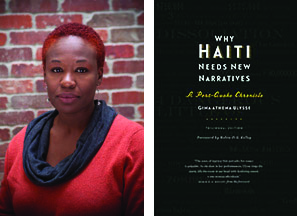Mainstream news coverage of the catastrophic earthquake of January 12, 2010, reproduced longstanding narratives of Haiti and stereotypes of Haitians. Cognizant that this Haiti, as it exists in the public sphere, is a rhetorically and graphically incarcerated one, the feminist anthropologist and performance artist Gina Athena Ulysse embarked on a writing spree that lasted over two years. As an ethnographer and a member of the diaspora, Ulysse delivers critical cultural analysis of geopolitics and daily life in a series of dispatches, op-eds and articles on post-quake Haiti. Her complex yet singular aim in Why Haiti Needs New Narratives is to make sense of how the nation and its subjects continue to negotiate sovereignty and being in a world where, according to a Haitian saying, tout moun se moun, men tout moun pa menm (All people are human, but all humans are not the same). This collection contains thirty pieces, most of which were previously published on Haitian Times, Huffington Post, Ms Magazine, Ms Blog, NACLA, and other print and online venues. The book is trilingual (English, Kreyòl, and French) and includes a foreword by award-winning author and historian Robin D. G. Kelley.
Gina Athena Ulysse is an associate professor of anthropology at Wesleyan University. Born in Haiti, she has lived in the United States for over thirty years. A performance artist, multimedia artist, and anthropologist, she is the author of Downtown Ladies: Informal Commercial Importers, a Haitian Anthropologist, and Self-Making in Jamaica. Robin D. G. Kelley is the Distinguished Professor of History and Gary B. Nash Endowed Chair in United States History at UCLA.
“Five years after the earthquake that razed Haiti, feminist anthropologist Ulysse reclaims the cultural narrative of her homeland from its simplification and distortion by mainstream news coverage. In her trilingual (English, Kreyòl, French) collection of op-eds, essays, reviews and news articles…Ulysse rejects the colonial framework through which Haiti is often viewed and reasserts the validity of its sovereignty.”
–Ms. Magazine, Spring 2015
The Driftless Connecticut Series is funded by the Beatrice Fox Auerbach Foundation Fund at the Hartford Foundation for Public Giving, www.wesleyan.edu/wespress/driftless.
Praise for Why Haiti Needs New Narratives:
“Ulysse’s clear, powerful writing rips through the stereotypes to reveal a portrait of Haiti in politics and art that will change the way you think about that nation’s culture, and your own.”
—Jonathan M. Katz, author of The Big Truck That Went By: How the World Came to Save Haiti and Left Behind a Disaster“This is a beautifully written and profoundly important work of engaged anthropology. Gina Ulysse steps bravely into the public domain bringing a nuanced and sophisticated analysis of things Haitian to a large group of general readers as well as to a broad audience of scholars. Publication of this book marks a kind of “coming of age” for anthropological bloggers and public anthropology.”
—Paul Stoller, author of Yaya’s Story: The Quest for Well-Being in the World“Gina Athena Ulysse’s compilation, Why Haiti needs New Narratives: A Post-Quake Chronicle, is the gut-felt testimony of an insider/outsider that resounds as a thunderclap in the desert. Trapped in the alienating context of sterile academia, neoliberal political economy, populations displaced, shock therapy and general geopolitical shifts, the author’s gift of polysemy opens horizons. Through thought, action, word, poetry, song . . . flow yet unbounded prospects.”
—Rachel Beauvoir-Dominique, professor, Université d’Etat d’Haïti“Taking us through entangled and liberating possibilities, Gina Ulysse introduces us to Haiti, the kingdom of this world. Embedded in the interstices of words and other aesthetic sensibilities that summon the past into the present, the powerful promise of a people is revealed. Ashe.”
—Arlene Torres, coeditor of Blackness in Latin America and the Caribbean“The sense of urgency that pervades these essays is palpable. Similar to her performances, Ulysse rings the alarm, fills the room in our head with deafening sound, a one-woman aftershock.”
—Robin D. G. Kelley, from the foreword







